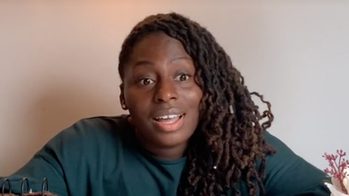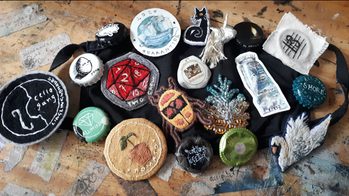How to get through when your plans fall apart
"I have experienced struggles with my own mental health." Ruth talks honestly about how she's got through the darkest times in her life.
Hey, everybody. My name's Ruth. And I just wanna spend the next few minutes talking to you about what life looks like when perhaps our dreams, or our hopes, or our plans don't go the way we thought they would.
So, as I've already said, I'm Ruth, I'm married, and I live in the southeast of England with my husband and my two cats.
And, you know, there have been really difficult, dark times in my life. I've experienced struggling with my own mental health. I, at one point in my life, was diagnosed with PTSD. No, I didn't go to a war-torn country. I didn't see a violent attack. Something really deeply personal in my own family life changed, and the emotional trauma that I was left with as a result of that led me to being diagnosed with PTSD. I walked a tough journey with that.
My husband and I haven't been able to have children. And although probably lots of you watching this vlog are a really, really long way away from that, that's been something that's been deeply painful and has been difficult for us to walk through.
But you know, it's in those moments that I've realised, sometimes our plan B or what we think is our plan B, our plan B for our university, our plan B for the boyfriend that we want, or the girlfriend that we want, our plan B for the way that our family is gonna look actually can turn out to be the best plan A we could have ever hoped for.
But, you know, that takes real sitting with some things that are quite painful. And there's been a few things in my life that have really helped me in those moments that have felt dark, and overwhelming, and difficult.
One of the first things is talking therapies. I have had a fair share of counselling in my life and you know, I'm not afraid to admit it. I'm not afraid to talk about it. I'm not afraid to own that. And nor should you be. If you feel you've come to the point in your life where some of the stuff that you're wrestling with, some of these plans not working out for you, need some space and some time, then give them that space and time and ask your parents or whoever you live with to think about trying to reach out for some talking therapy.
The other thing is journaling. I found that so helpful in my own life. Taking time out to reflect on where in my life things haven't gone the way I thought they would. When I felt alone and sad, noting those things down, keeping a track of my good days and my not-so-good days, having a reference point at the end of each week to look back and think about the things that have gone well. That's been a really helpful tool for me, too.
And I would say the third one is trusted people around me. I don't know who you've got in your life, but I would really, really encourage you to perhaps draw around your hand and think about the five people that you have in your life that you could go to about things when things become difficult.
If you can't think of five, that's okay. Just start with one, and slowly over time, as you build up your trusted network, add those people to that hand, too.
Now, when we trust people, we have to be really careful and we have to make sure that we know enough about them. So I'm talking about perhaps a teacher, or a university lecturer, or a friend of your family's that you've known for a really long time. I'm not talking about finding people online and sharing your life with them. You know, think carefully about who it is that you share your trusted information with. That's really important.
And most importantly, remember, that like I said at the beginning, when sometimes something looks like plan B, with enough space and enough time, and enough ability to grieve it, it can sometimes be the most incredible plan A.


